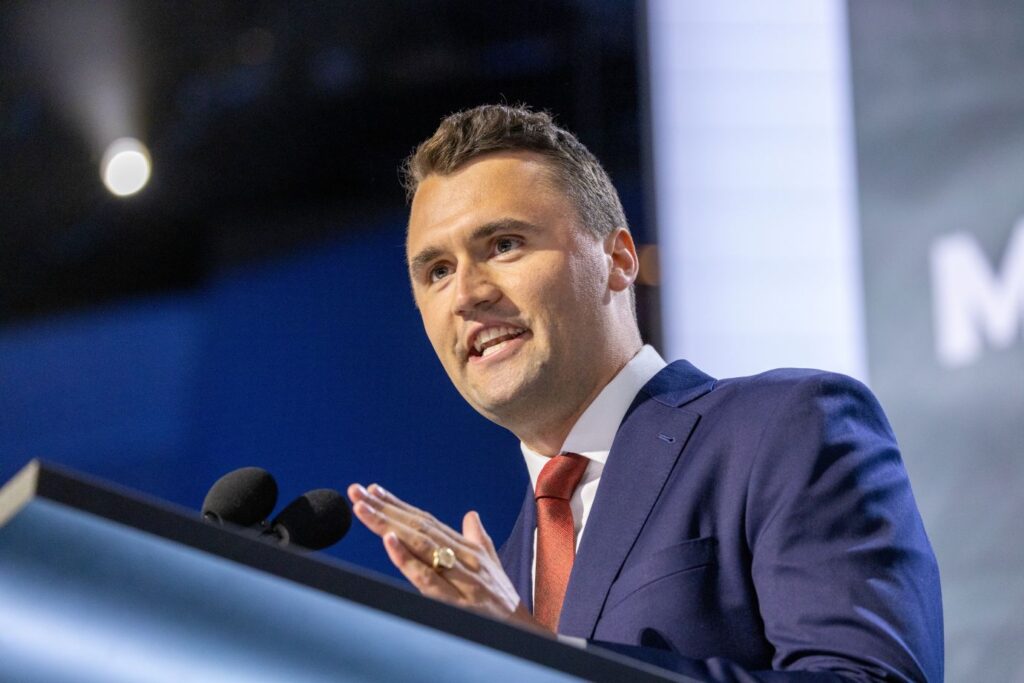In December 2021, I was in an exhibition hall in Phoenix, Arizona, with 10,000 young people who had come to hear a lineup of “America first” speakers, from Tucker Carlson to Ted Cruz. This was AmericaFest, an annual rally led by Turning Point USA, a conservative youth organisation whose founder and CEO, Charlie Kirk, was murdered on September 10.
I have spent the past four years listening most days to Kirk’s view of the world while carrying out research for my upcoming book, The Trouble With Freedom. He was charismatic, combative and at times inflammatory. But he was also strategic and clever.
He loved the US, freedom, family and football, and possessed an immense drive to “save America” from what he felt was its decline from greatness. With a national radio show and speaking tours focused on university campuses, his platform reached millions. There were times when he disseminated disinformation, but there were also times when I found myself agreeing with him.
Kirk was emblematic of a country polarised and imploding. At AmericaFest, and across a constellation of organisations and commentators working to “save freedom, save America”, the US is divided into those who are “loved” and those who are “hated”. This division is mirrored in progressive or liberal spheres.
Retribution is threatened and others are blamed. Opposing sides, each struggling for “the soul of the nation”, define the other by emotional indicators such as “angry”, “bitter”, “miserable”, “destroying”, “vicious”, “menacing”, “thugs”, “extremists”, “resentful”, “weak” or “unhinged”.
These sentiments serve a purpose. As cultural theorist Sara Ahmed argued in her 2004 book, The Cultural Politics of Emotion, it is through intensifying emotions that an “other” takes shape.
But while sharing emotions – rage as well as love – creates bonds, it also drives us away from others. This was something I experienced at AmericaFest as presenters repeatedly told the 10,000 young people present that people like me – childless, unmarried, atheist academics – hated them for being conservatives.
As people arrange themselves – where they live and who they socialise with – on the basis of how they feel, the end result can be a form of “partisan segregation”. Democrats and Republicans now appear increasingly unlikely to live with those who hold different political views.
Faced with rapid and profound changes, the idea of America and what it represents – freedom and prosperity – is slipping out of reach for some. This is creating feelings of loss and anger. In discussions I held with people from across the political spectrum, in social clubs, shooting ranges, workplaces and homes, people named points of cultural rupture.
Conversations were haunted by a feeling that community is breaking down. The promise of an affluent future is disappearing in the face of environmental collapse and successive financial crises. Deindustrialisation and the shift to a digital economy brings with it precarity. And fractious governance oversees divisions along generational, gendered, class, racial, religious, and rural and urban lines.
How people live together, and how they remember, has changed. The result is an anxiety-inducing realisation that safety can be contingent, random, luck of birth or where you happen to sit on a bus. Cultural breakdown can be watched incessantly, on repeat and archived for future reference as we doom scroll on our phones.
Responses to this rupturing and reshaping of life that was once taken for granted can range from psychological discomfort to murderous rage, as the world has just seen with Kirk’s assassination.
The US president, Donald Trump, understands this response and exacerbates it. He focuses on law and order, dystopian cities and out of control borders. He talks of a third world war not being far away, increasing anxiety and the subsequent desire for firmer ground, or a strong leader, to hang on to.
“Liberal” criticism of nationalist or populist responses neglects the pain some feel in managing change and the fears of being unsafe that go with it. This entrenches divisions further. More than just “angry Trump supporters” suffering from the loss of conservative leadership, the 2024 US election results suggest there is a broad spectrum of people who felt uncomfortable with a changing America that Democrats were held responsible for.
This is what Kirk tapped into and is encapsulated by Ines, one of the gen Z participants in my research. She said “generations that are growing up now don’t know a world where there wasn’t a school shooting every week … we were born into disaster and like our world is literally dying. So it’s like our generation doesn’t know a time when things were safe and comfortable.”
These divisions – alongside increasing inequalities, the misinformation and disinformation spread on social media and paralysed political systems – appear to be sending us collectively backwards into violent autocracy.
Even if it doesn’t feel like it right now, we can find ways to handle change and the emotions that come with it. In every conversation I’ve had across the political spectrum in the US, people talk about wanting to be part of something bigger – to care about more than just themselves, or to feel safe again through community. There’s a longing to bring back a sense of connection and care.
Even at their most angry, conversations indicated a desire to live in meaningful, caring relationships. Without a doubt, too much love and the boundaries of community become hard and less adaptable to change. But connection can also hold the potential to work against feelings of loss, ambivalence, hate and subsequent violence.
Melissa Butcher, Professor Emeritus, Social and Cultural Geography, Royal Holloway University of London
This article is republished from The Conversation under a Creative Commons license. Read the original article.


